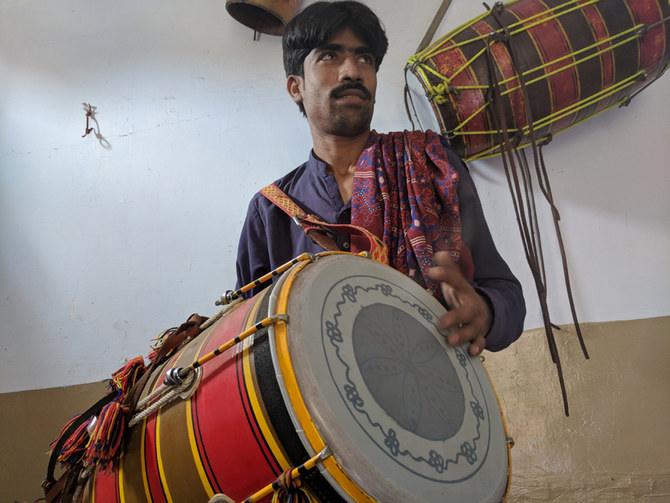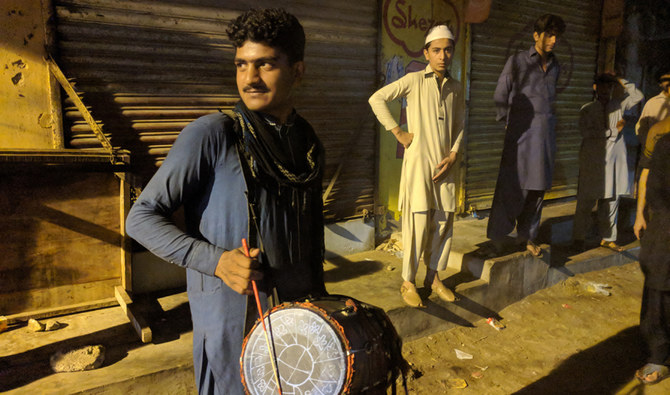KARACHI: It was just past 2am when the troupe of two dozen young men took to the hushed streets of Karachi, their colourful barrel drums hanging around their necks.
For a brief moment, they stood quietly on a dimly-lit street corner underneath a canopy of electricity wires and internet cables, soundlessly tapping on their two-headed drums.
Then slowly, they began pounding out a hastening rhythm, hitting their drums with wooden sticks and strolling down the streets as houses and shops lit up all around them and people looked out of doors and windows.
The group is the last of Karachi’s Ramadan drummers who have for generations roamed the streets to wake up worshipers for suhoor, a pre-dawn meal, before the day’s fasting begins in the holy month.
Today, the age-old practice has run headlong into modernity. Traditional neighbourhoods in the sprawling port-side metropolis are gradually being replaced by tower blocks and the tradition’s usefulness has been eclipsed by TV, mobile phones and alarm clocks.
“We pass by streets where people come out and scold us for waking their children up,” 22-year old Kashif Khan said in Keemari, one of Karachi’s oldest neighbourhoods, a congested mishmash of slums, fishing boats, shipping containers and trucks.
Next to him, his 20-year old partner Asim Ali tapped his drum lightly, creating a marching beat.
“We who are keeping old traditions alive are given the least respect now,” he said.
Ramadan marks the month in which the Quran was revealed on Prophet Muhammad. Fasting, by abstaining from food and water from sunrise to sunset, is one of the five pillars of Islam, a grueling routine the devout repeat every day for a month.
In much of the Muslim world, particularly the Middle East, suhoor drummers call for people to wake up.
Khan and Ali said they had been playing the drums for most of their lives and their fathers and grandfathers were also drummers. Two of Ali’s brothers were drummers in the Pakistan army and another three played events, he said.
The duo make a year-round living performing at birthdays and wedding parties for approximately $7 a gig. In Ramadan, they leave their makeshift homes by the railway tracks in Keemari two hours before dawn and prowl the streets right up until the sun begins to creep out over Karachi’s tattered skyline.
“Before us our forefathers did the same,” Ali said. Khan piped in: “I’m the fifth generation of drummers. So it’s not just a profession for us. We love doing this.”
At Keemari’s Massan Chowk, a road junction where the drummers stopped for a break in the rising heat, Khan pulled out an old Nokia cellphone and showed off photos of his grandfather’s drum, which he says is his most prized possession.
Behind him, the sleepy voice of an imam boomed from the loudspeaker of a mosque, urging people to wake up. Khan chuckled. Even the sound of mosque loudspeakers couldn’t reach as far as our drumming can, he said as he started playing at full volume, his beats echoing off nearby buildings.
Akhtar Baloch, a writer and researcher in Karachi, said the practice of Ramadan drumming began in the Indian subcontinent centuries ago but became particularly popular in 80’s Karachi when suhoor drummers roamed neighborhoods playing small folk drums and singing qawwalis, or sufi devotional poetry, to wake people up.
“Previously, a faqir [holy man] would put stones in a box and shake it to make a sound around the streets; then the drums took his place,” Baloch said, adding that people would give gifts to the drummers at the end of Ramadan as tokens of gratitude.
But people were tired of the expectation of nightly alms, the drummers said, and where they had been paid $50 dollars for an event just five years ago, they now got $5.
On Eid-ul-Fitr, the religious festivals that marks the end of Ramadan, Ali said most families barely coughed up Rs.100, less than a dollar.
“If fifty people live in a neighbourhood,” Khan said, “less than ten will give us some money.”
Teenager Habib ur Rehman, a resident of Keemari, said though his mother did not rely on the drummers to wake up and didn't offer them money, she took the clangor as a signal to make sure everyone was now seated at the table with sufficient time to eat.
“Everyone is not the same but the attitude of some people is very painful,” Khan said. “When people tell us off, we get upset but we just quietly leave the place. We can’t afford to fight.”
In spite of the challenges and resistance, the drummers said they will continue playing.
“The work of our forefathers, and the instruments they played, they are dear to us,” Khan said.
Behind him, the nearby mosque’s loudspeaker rang out with the chants of a choir of children reading verses from the Quran.
It was just past 3am and the drummers had been playing for over an hour and a half.
Ali pulled the strap of his drum from over his head and set the instrument down on the sidewalk. He wiped the sweat off his face with the sleeve of his tunic and smiled. Now it was his turn to scramble to find a quick meal before the call for the morning prayer after which Muslims are forbidden to eat again until sunset.
“Drumming is all about happiness,” Ali said. “It doesn’t matter if some people don’t like us. Tomorrow we’ll be back again to walk these streets and wake people up.”
















